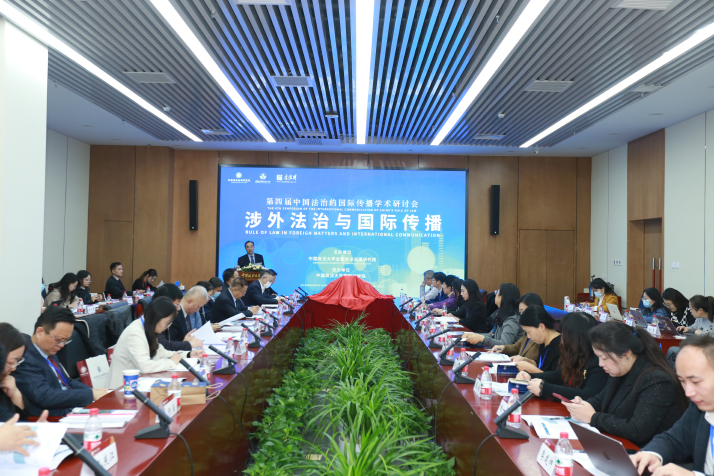| China |
| Progress in China's rule of law on foreign affairs | |
|
|
 The Fourth Symposium of the International Communication of China’s Rule of Law in session at the China University of Political Science and Law in Beijing on November 19 (COURTESY PHOTO)
Meerzat Omuralieva, a 31-year-old woman from Kyrgyzstan, runs a jewelry business in Yiwu, Zhejiang Province, which is home to the world's largest small commodities market and has embraced merchants from around the globe. Omuralieva first began working as a volunteer on the city's mediation committee for disputes relating to foreign trade and transactions when she was studying at college in Yiwu in 2017. Now, the committee has employed her as a full-time mediator. As the annual number of overseas businesspeople flowing into Yiwu has regularly exceeded 550,000 in previous years, the demand for mediation on commercial and customs-related disputes has been growing. As early as 2013, the municipal government established the mediation committee for international disputes. Over the past decade, the committee has handled over 1,200 disputes involving people from other countries, resolving 96 percent of them. Today, it has 13 mediators from 12 countries. The committee is one example of China's efforts to improve the legal system related to foreign affairs, Huang Jin, head of the Chinese Society of International Law, told Beijing Review. China has seen progress in legislation, law enforcement, the rule of law and the delivery of justice in recent years. Huang made the remarks at the Fourth Symposium of the International Communication of China's Rule of Law, held at China University of Political Science and Law in Beijing on November 19. A blue book compiled by the university on the development of China's rule of law involving foreign affairs was also released during the symposium. "China has attached increasing importance to the rule of law related to foreign affairs and seeks to play a bigger role in safeguarding it," Huang said. Notable progress According to Huang, the formulation of the Law on Foreign State Immunity, the amendment to the Civil Procedure Law and the implementation of the Law on Foreign Relations are major highlights this year. As of early November, 299 laws had taken effect in China, including 53 relating to foreign affairs and more than 150 containing foreign-affairs clauses. To improve laws concerning safeguarding national sovereignty, security and development interests, the Standing Committee of the 14th National People's Congress, China's top legislature, passed the Foreign Relations Law in June, further improving China's tool kit for combating foreign interference and long-arm jurisdiction. The law, which came into effect on July 1, centers on facilitating exchange and enhancing communication and cooperation. In its general principles, the law stipulates that China adheres to opening up for mutual benefit. On September 1, the Law on Foreign State Immunity was passed by the top legislature. The law, which will take effect on January 1, 2024, affirms that a foreign state and its property enjoy immunity in China, and stipulates exceptional cases under which Chinese courts can exercise jurisdiction, such as commercial disputes and personal injury. "The law has adjusted China's previous stance of absolute state immunity and authorized courts in China to hear lawsuits against foreign states. It fills in the gap in China's rule of law related to foreign affairs, which is a significant move," Huang said. According to the Ministry of Foreign Affairs of China, the law protects the legitimate rights and interests of concerned parties, which will boost China's high-level opening up and improve the domestic business environment. China is also furthering the revision of the Arbitration Law. Huang suggested the amendment be aligned with the Model Law on International Commercial Arbitration formulated by the United Nations Commission on International Trade Law. According to the blue book, China has cooperated with other countries on law enforcement for maritime security, intellectual property rights (IPR) and anti-monopoly. With the launch of the anti-foreign sanctions law, export control law and foreign investment law, China will be able to better manage challenges from the complex international landscape, contribute to upholding global peace and improve its international competitiveness. China has also strengthened its global judiciary partnerships and improved legal services relating to foreign affairs. Since its establishment in late 2019, the Belt and Road International Lawyers Association, a China-initiated international organization focusing on providing legal services, has built itself into a platform for legal service cooperation between countries and regions. It has over 2,600 group and individual members from 54 countries and regions. The association has provided services for major Belt and Road projects, which are built to boost connectivity along and beyond the ancient Silk Road routes, including the China-Pakistan Economic Corridor, the China-Thailand Railway and the national power grid in Laos. China's IPR protection laws and regulations have also further taken effect. Last year, China joined two major treaties of the World Intellectual Property Organization, developing IPR cooperation with over 80 countries and regions. According to the Intellectual Property Court of the Supreme People's Court of China, which was established in 2019, it has handled over 1,200 cases involving foreign affairs over the past four years, of which over 800 were concluded. The parties in approximately 4 percent of these cases were both from other countries. Earlier this year, CIRCUTOR, a Spanish electronic equipment company, found its name copied by a company registered in Shanghai. After CIRCUTOR reported the infringement to the local market regulation bureau in Shanghai, the company infringing the IPR was fined and required to change its name. China's IPR protection efforts are gaining it increasing credit. Over the past decade, over 110 countries participating in the Belt and Road Initiative applied for over 250,000 patents in China, according to the China National Intellectual Property Administration.  International merchants select goods at the 2023 China Yiwu Imported Commodities Fair in Yiwu City, Zhejiang Province, on October 21 (XINHUA)
More cooperation In 2020, China's coffee chain Luckin Coffee Inc., which had listed its shares for trading on the Nasdaq stock market in the United States, revealed accounting fraud by its employees, leading to credit doubts of Chinese enterprises listed overseas. The China Securities Regulatory Commission (CSRC) worked with U.S. securities counterparts to audit several Chinese enterprises listed on U.S. stock exchanges, reaching agreements that avoided a massive delisting of the companies. Luckin was later fined $180 million by the U.S. Securities and Exchange Commission. After a company reshuffle, the brand is now China's top coffee chain. According to the CSRC, this global auditing cooperation is conducive to building a more predictable international regulatory environment and protecting lawful rights of global investors. Such cooperation will further the development of a sustainable cooperation mechanism. As Huang noted, China also needs to improve global cooperation on training professionals to provide better legal services, and strengthen enforcement of the rule of law involving foreign affairs. There are still shortcomings in law enforcement on cross-border economic exchanges and trade in China, especially on imports and exports of goods and tariffs. The blue book said that Chinese authorities need to improve laws and regulations on foreign trade and investment to support the operations of foreign-invested companies and open up domestic market, and further align with international economic and trade rules. In early November, the National Development and Reform Commission pledged to revise or repeal laws and regulations inconsistent with China's Foreign Investment Law and regulations on improving the business environment. "China should also integrate laws involving domestic and foreign affairs. While ensuring the legitimate rights of overseas businesses operating in China, it also needs to enhance legal support for Chinese enterprises to expand internationally," Huang said. (Print Edition Title: Legislation for Collaboration) Copyedited by G.P. Wilson Comments to lixiaoyang@cicgamericas.com |
|
||||||||||||||||||||||||||||
|
